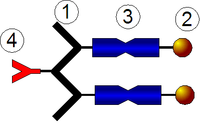
Photo from wikipedia
Abstract The temperature-sensitive branched heterogeneous catalyst was designed and fully characterized. The synthesis involves the preparation of the intermediate that protoporphyrins (PP) were immobilized onto polyvinyl alcohol (PVA), which was… Click to show full abstract
Abstract The temperature-sensitive branched heterogeneous catalyst was designed and fully characterized. The synthesis involves the preparation of the intermediate that protoporphyrins (PP) were immobilized onto polyvinyl alcohol (PVA), which was used to produce polymer support with branched chains poly(N-isopropylacrylamide) (PP-PVA-PNIPAm) via photo-induced electron/energy transfer reversible addition-fragmentation chain transfer polymerization. And then PP-PVA-PNIPAm was metalated with manganese to form the temperature-sensitive branched heterogeneous Mn(III)(PP)Cl-PVA-PNIPAm. To test temperature-sensitive effect of Mn(III)(PP)Cl-PVA-PNIPAm in catalytic process, it was used for the catalytic oxidation of low concentration Fe2+, which plays an important role in sustaining equilibrium between Fe2+ and Fe3+ in life. The results showed that the catalytic efficiency of Mn(III)(PP)Cl-PVA-PNIPAm was higher than the unsupported manganese porphyrins and exhibited a downward trend after the first rise with the increase of reaction temperature. High temperature resulted in the shrink of temperature-sensitive branched chains of Mn(III)(PP)Cl-PVA-PNIPAm and increased mass transfer resistance in the reaction process. According to the density functional theory calculation, the interaction energy between oxidant H2O2 and shrunken Mn(III)(PP)Cl-PVA-PNIPAm is weaker than that of H2O2 with unshrinking Mn(III)(PP)Cl-PVA-PNIPAm. Moreover, the temperature-sensitive effect of Mn(III)(PP)Cl-PVA-PNIPAm is dependent on the graft ratio and the length of branched chains. The topological polymers with temperature-sensitive branched chains are potential support for catalysts to suppress the runaway phenomenon in catalytic exothermal reactions.
Journal Title: European Polymer Journal
Year Published: 2020
Link to full text (if available)
Share on Social Media: Sign Up to like & get
recommendations!